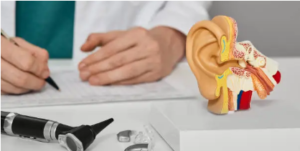Posted on January 18, 2024
APD Adelaide: Auditory Processing Disorder (APD) Therapy
Auditory Processing Disorder (APD) is an upsurge disorder that affects 3-5% of children of school age. It affects their learning and development.
At SASHC, we believe in a holistic approach so that your child will have their APD assessed and treated by both speech pathologists and audiologists. It ensures that any underlying language difficulties are also addressed. For more information about the APD therapy Adelaide, click here.
What is APD?
 Auditory Processing Disorder (APD), also known as Central Auditory Processing Disorder, is a condition that makes it hard for kids to understand what they hear. It is because the sounds that enter their ears don’t make it to their brain correctly and aren’t interpreted like other children’s brains.
Auditory Processing Disorder (APD), also known as Central Auditory Processing Disorder, is a condition that makes it hard for kids to understand what they hear. It is because the sounds that enter their ears don’t make it to their brain correctly and aren’t interpreted like other children’s brains.
It can make it difficult for a child to follow directions, listen in class or even talk with others in noisy places. Often, the symptoms of APD are very similar to those of attention deficit hyperactivity disorder or ADHD, so it is easy for them to get misdiagnosed and put on unnecessary medication.
The cause of APD isn’t fully understood, but it can be linked to certain conditions such as head injury, ear infections or perinatal anoxia. Treatment focuses on changing the learning environment, recruiting higher-order skills and remediating the auditory deficit. Children with APD can benefit from strategic seating in the classroom that minimises noise and visual distractions.
Symptoms
People with APD often have normal hearing, and they usually have no problem understanding sounds that aren’t speech (peripheral hearing). But something interferes with the brain’s ability to coordinate sound information. It is hard to distinguish minor good differences within words and follow ongoing speech, especially in noisy or reverberant environments. It also makes it difficult to remember what is heard. For more information about the APD therapy Adelaide, click here.
Children with APD often have trouble following teacher instructions and get distracted easily in class. They may also have trouble focusing on homework and find it challenging to keep up with the reading material in their class.
If you notice that your child struggles to understand others when they are talking or seem to be missing a lot of information, speak to their GP or paediatrician about having them seen by an Adelaide audiologist specialist who can test for APD. Only audiologists are qualified to diagnose APD. Other professionals who might be able to help include speech pathologists, educational psychologists and social workers.
Diagnosis
APD can be difficult to diagnose because the symptoms are similar to those of hearing loss, an intellectual disorder, language difficulty or even attention deficit hyperactivity disorder. It is often confused with learning disabilities or considered a part of them.
Children with APD may have problems remembering verbal instructions and finding it hard to keep up with conversation in a noisy room. They may say “huh?” or ask others to repeat themselves a lot. They may struggle with reading and spelling. They often fall behind in school and tend to be easily distracted.
To assess APD, doctors will usually start with a thorough case history. It is when they will learn about the patient’s family, work and lifestyle, and any habits, vitamins or medications that might impact their condition. It will help them determine how severe the symptoms are.
Treatment
People with APD can be treated by cognitive-behavioural therapy, which a psychologist or psychiatrist conducts. Different medications can be used to manage the symptoms of APD.
Children with APD often have trouble understanding speech in noisy places, remembering and following verbal instructions, locating sounds and identifying speech sounds. It can impact their literacy development and reading. It can also make them appear disinterested or distracted in group situations. APD can co-exist with attention deficit hyperactive disorder (ADHD) or autism, and it is essential to distinguish between the two conditions so they are managed correctly.
If your child has trouble with APD, you can take them to an audiologist. They will conduct a series of tests to assess their hearing and how the brain processes information. These include pure-tone audiometry and dichotic speech testing. These tests will help to determine the severity of the APD. Your child may be referred to a psychologist and speech pathologist. For more information about the APD therapy Adelaide, click here.

